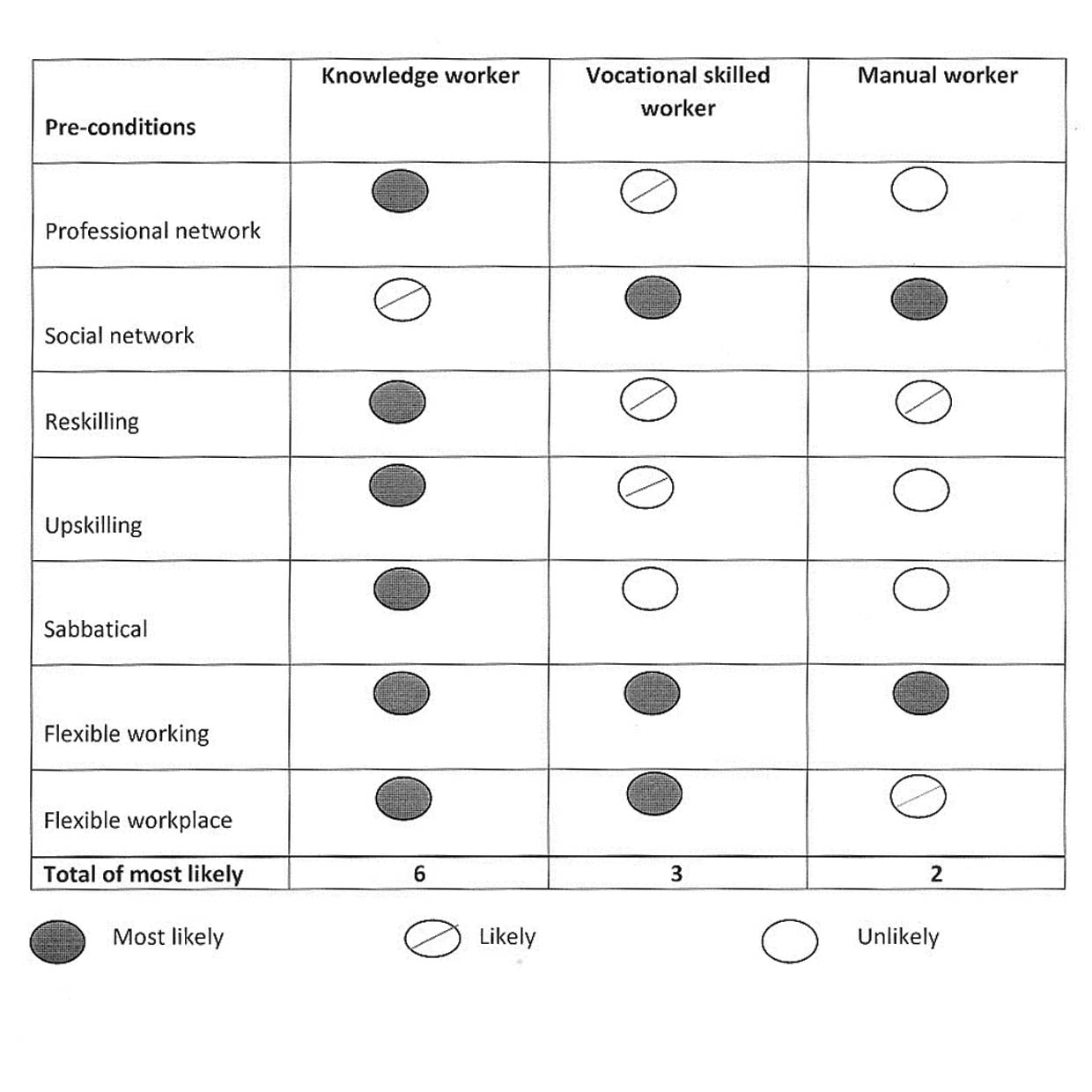

Wed 29 / 07 / 20
The working time bomb: Covid-19 makes it even more crucial for us to preserve the skills of our older, wiser workers
The working time bomb is ticking; our population is ageing, people are living longer and fewer young people are entering our workforce. In addition, Covid-19 now threatens to wreak havoc on our working lives. We urgently need a strategy to ensure our older workers can work much later in life, says Nicolette Wykeman of Silverforce Coaching.
By Nicolette Wykeman of
This year, for the first time in history there will be more people worldwide aged over 65 than aged under 5. Our ageing population means that our workforce too, is ageing. In addition, life expectancy is increasing. By 2050, people aged 65 might expect to live up to 35 years more. Clearly, it has never been more important to consider how organisations will be able to facilitate working past the traditional retirement age. This is before we even begin to consider the complex set of challenges the Covid-19 pandemic will present for the UK workforce. Unemployment, disappearing jobs and decreased value of pension savings are just some of the difficulties we will face.
This melting pot of issues amounts to a ticking time bomb for our jobs market and our economy. How can we address these problems, support people to work later in life and make sure we retain vital skills gained over many years of experience?
A workforce made up of different skills: professional, vocational and manual
Before the pandemic, the debate around our ageing workforce tended to focus on how to retain and retrain professional workers and those who work in offices. For this group, some initiatives are already in place, such as the so-called ‘midlife MOT’ for people over 45, which presents a clear picture of their health, wellbeing, financial situation and career. Aviva and Legal & General are among the companies offering this. The result might be working more flexible hours or being given training and mentoring.
However, the Covid-19 pandemic makes it more crucial than ever to have a strategy to keep all older people working later, including vocational skilled workers (such as electricians and plumbers), and manual labourers. As we return to work after this crisis, there will be many younger unemployed workers in desperate need of jobs, ready and willing to take on labour intensive work. This might have the effect of pushing thousands of older workers out of the workforce, but it could be argued that with fewer people entering the workforce we will need a strategy to keep people working well into their seventies.
Encouraging people to work later in life
There are some barriers to overcome if we are to encourage people to work beyond the age of 65. The physical demands of manual and labour-intensive roles mean they are often not suited to older workers. However, vocational workers in particular have skills which are urgently needed and not easily automated. We need to find out how these often overlooked groups could be encouraged to work longer and what support they might need to be able to do so.
Here are some of the initiatives and pre-conditions which need to be considered:
Professional network
Office workers have often built and maintained a reliable professional network during their working years. It is common to progress through the career ladder and secure new roles through networking alone, and this can continue to apply in later years.
Colin Love, aged 73, had over 30 years’ work experience in different senior positions in international organisations before completing an MBA when he was 50; a networking experience which led directly to his new role. He says:
“Two weeks before I was due to retire, I was approached by the business school where I completed my MBA to become their academic director. I love my new role and have no intention of slowing down at all - quite the opposite in fact! I even have an exciting new project on the way, fixing racing motorbikes. I believe everyone of retirement age should stay mentally and physically active regardless of whether their job is paid or unpaid.”
Social network
Most plumbers and electricians work locally, so their social network is likely of greater importance in relation to remaining working until retirement. They often work for many years for the same employer and so they might not have built a professional network as extensively as professional workers. Skilled vocational workers have often formed long-term friendships with their work colleagues and apart from a salary, their social network is what they value the most.
Reskilling
As job roles start to become less relevant due to automation, improved technologies or Covid-19, all organisations will need to have a reskilling strategy in place, offering people the chance to learn new skills and competencies which allow a transition to a different career. For example, an ageing administrator could be reskilled into a more managerial or analytical role. A plumber or an electrician who cannot continue working due to physical boundaries could learn the skills necessary to move into the IT sector, or teach their vital skills to new, young job-seekers. Local governments could offer older workers retraining programmes for skills which will be high in demand after the Covid-19 pandemic.
After a successful career in the oil and gas industry, Vince, aged 65, was made redundant in his early fifties. He re-invented himself and applied his transferable skills to a different organisation and sector, becoming Head of Professional Guidance at a leading girls’ independent school. Vince says:
“I knew my business skills would be valuable and it was a matter of convincing the school that despite my lack of background in the sector, I could pick up the role and adapt. It was a success; I had four great years and it led me to think longer term about a career that would involve academia and my love for coaching. I’m currently combining different teaching and coaching positions in the educational sector, without a desire to retire any time soon.”
Upskilling
If companies want to improve their older workers’ skills so they can continue in the same roles, they should look to offer opportunities to learn new skills and competencies within the same job profile. For example, a professional in an IT department could be offered training in coding. Plumbers and electricians could be introduced to new sustainable energy technologies and truck drivers could be trained in the latest self-driving innovations .
Sabbatical
As discussed in the bestselling book ‘The 100-year Life’ by Gratton and Scott (2017), employees could be persuaded to work later in life if they are given the opportunity to take a sabbatical of a few months or even longer to recharge, travel, take up training or study. Sabbaticals are more common among professionals than in other groups because vocational workers are often self-employed and not in a financial position to do so. The government could give a grant or compensation to encourage people to take up this opportunity and return to work after recharging their batteries.
Flexible working
According to Mercer (2018), only 19 per cent of UK companies currently have a proper flexible working policy in place. The lack of a clear policy can result in confusion and resentment in the workplace. Where a good salary and competitive compensation used to be the main motivations for job seekers, today employees of all ages show an increasing interest in a healthy work-life balance. If employers were to offer more flexibility, all types of workers could be encouraged to continue working beyond the traditional retirement age. Covid-19 has demonstrated that companies have the ability to adapt quickly and provide flexible working arrangements; a trend that surely will continue.
Richard, aged 52, from Kent, accepted voluntary redundancy after taking a sabbatical at 47. He is currently self-employed and working as an electrician as well as the homemaker for his family which suits his lifestyle. He can control his own hours, take long holiday breaks in between jobs, and it keeps him physically and mentally fit. Instead of stopping, he would encourage electricians to continue working after their retirement age. He says:
“It is a job where you need some physical flexibility but it is proven that people’s mind and body stay healthy in later life by continuing some type of work”.
Flexible workplace
In many offices, there is already an increased awareness of the need to adapt workstations to suit older employees, for example by offering adjustable tables and chairs. However, it is not yet compulsory for employers to offer a more ergonomically accommodating workplace. The UK could learn from the example of a German BMW factory where they set up a special line for older workers in 2007, staffed with employees with an average age of 47. The factory implemented a number of measures such as enhancing workers’ skills, adjusting the work environment and instituting flexible working policies. Staff were listened to and consulted, and the changes resulted in an increased productivity of 7% in one year.

The matrix above shows the current status of different workers, in terms of their likelihood of being able to continue working past retirement. It can be concluded that current and future corporate and government policies need to support the opportunites available to vocational and manual workers, if they are to be encouraged to continue offering their valuable contribution and skills to the UK workforce. All stakeholders including trainers, teachers, trade unions, governments, employers and employees will need to work collaboratively in order to implement effective solutions and make sure we defuse this ticking time bomb before it’s too late.

By Nicolette Wykeman of Silverforce Coaching
Sources:
Bauer, E. (2018) Yes, Blue-Collar Workers Could Be Harmed by A Higher Retirement Age. What Next? https://www.forbes.com/sites/ebauer/2018/10/11/yes-blue-collar-workers-could-be-harmed-by-a-higher-retirement-age-what-next/#17cfc91e62be (accessed 14/01/2020)
Cavendish, C. (2019) Extra time. London: Harper Collins
Gratton, L. and Scott, A. (2017) The 100-year life. London : Bloomsbury
Gratton, L. and Scott, A. (2020) The new long life. London: Bloomsbury
Loch, C., Sting, F., Bauer, N. and Mauermann, H. (2010) The Globe: How BMW Is Defusing the Demographic Time Bomb
https://hbr.org/2010/03/the-globe-how-bmw-is-defusing-the-demographic-time-bomb (accessed 28/04/2020)
McKinsey (April 2020) How to build and reimagine jobs amid the Corona crisis
https://www.mckinsey.com/industries/public-sector/our-insights/how-to-rebuild-and-reimagine-jobs-amid-the-coronavirus-crisis (accessed 18/04/2020)
Mercer (08/01/2020) One answer to the longevity challenge: make flexible working smart
https://www.mercer.com/our-thinking/career/one-answer-to-the-longevity-challenge.html?dysig_tid=63d985f70233457b818bf08b9d2c902a&utm_leadsource=voicestorm&userid=584&channelid=645&channeltype=LinkedIn (accessed 15/01/2020)
O’Connor, S. (2019) Britain’s blue-collar immigration plan is a superficial fix
https://www.ft.com/content/172eb074-17f7-11e9-b93e-f4351a53f1c3 (accessed 14/01/2020)
World Economic Forum (2017) Accelerating Workforce Reskilling for the Fourth Industrial Revolution An Agenda for Leaders to Shape the Future of Education, Gender and Work
http://www3.weforum.org/docs/WEF_EGW_White_Paper_Reskilling.pdf (accessed 28/04/2020)
If you want to contribute to the Chamber blog, contact us on hannah@brightonchamber.co.uk



